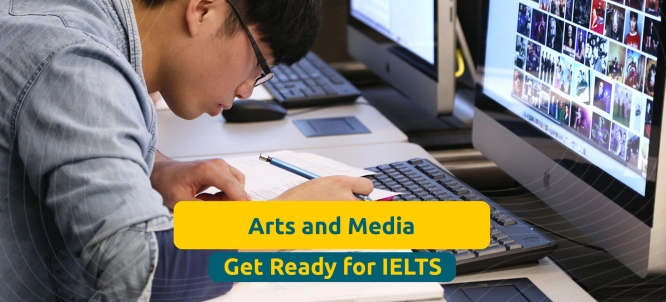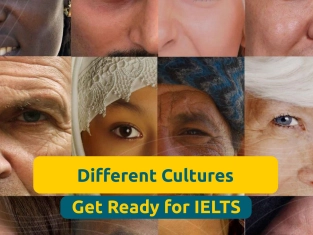by PushtoLearn
Arts and Media
Table of Contents
Arts and Media Flashcards - Vocabulary Practice for IELTS
These exercises focus on Arts and Media Vocabulary
List of Arts and Media Words for the IELTS
|
Word/Phrase |
Definition |
Example |
|
Percentage |
A portion of 100. |
The percentage of people consuming digital media has risen. |
|
Fraction |
A small part or portion of something. |
Only a fraction of the audience preferred live theater. |
|
Approximately |
Close to or roughly. |
Approximately 60% of the respondents watch TV daily. |
|
Just Over |
Slightly more than a specific amount. |
Just over half of the survey participants preferred podcasts. |
|
Decrease |
To become smaller or less. |
There has been a decrease in newspaper subscriptions. |
|
Increase |
To grow in size or number. |
Streaming platforms have seen an increase in popularity. |
|
Based On |
Grounded or derived from something. |
The film is based on a famous novel. |
|
Dilemma |
A difficult situation or decision. |
The dilemma was whether to produce a film or a series. |
|
Curiosity |
A strong desire to learn or know something. |
Curiosity about space exploration inspires many documentaries. |
|
Digital |
Relating to technology or computer systems. |
Digital media has revolutionized the arts industry. |
|
Rise |
An upward movement or increase. |
There has been a significant rise in the use of e-books. |
|
Accidental |
Happening by chance. |
The discovery of this technique was entirely accidental. |
|
Decline |
To decrease or diminish. |
The decline in art gallery visitors is concerning. |
|
Deliberate |
Intentional or planned. |
The decision to use minimal dialogue was deliberate. |
|
Waste Time |
To use time ineffectively. |
Watching too much television can waste time. |
|
Assemble |
To gather or bring together. |
The director assembled a talented cast for the film. |
|
Outweigh |
To be more significant or important than something else. |
The benefits of digital art outweigh the challenges. |
|
Permit |
To allow or authorize. |
Photography is not permitted in the museum. |
|
Worsen |
To make something worse. |
The lack of funding has worsened the condition of historic sites. |
|
Odd |
Strange or unusual. |
The artist’s odd style attracted both praise and criticism. |
|
Delight |
Great pleasure or happiness. |
The exhibition was a delight for art lovers. |
|
Crammed With |
Completely filled with something. |
The gallery was crammed with visitors during the weekend. |
|
Catch the Interest |
To grab someone’s attention. |
The vibrant colors in the painting caught the interest of many viewers. |
|
Let Somebody Go |
To dismiss or release someone. |
The magazine had to let several employees go due to budget cuts. |
|
Prevent From |
To stop something from happening. |
Strict rules prevent visitors from touching the artwork. |
|
Replace |
To take the place of something or someone. |
Streaming platforms have largely replaced DVDs. |
|
Look Up Unfamiliar Words |
To search for the meaning of new words. |
When reading art critiques, it’s helpful to look up unfamiliar words. |
|
Make Notes |
To write down key points or ideas. |
Students were encouraged to make notes during the film screening. |
|
Surround With |
To be encircled by something. |
The artist likes to surround herself with creative individuals. |
|
In Order To |
For the purpose of achieving something. |
The project was initiated in order to preserve local culture. |
|
Educational |
Providing knowledge or learning. |
The documentary was highly educational for students. |
|
Made-Up Stories |
Fictional narratives or tales. |
Many movies are inspired by made-up stories. |
|
Need to Be Carried Out |
Something that must be completed. |
Research needs to be carried out to understand audience preferences. |
|
Scientific Findings |
Discoveries based on research and experiments. |
The film included scientific findings about climate change. |
|
Confirm |
To verify or validate something. |
The artist’s influence on the movement was confirmed by experts. |
|
Need to Be Convinced |
To require persuasion or proof. |
Some people need to be convinced about the value of contemporary art. |
|
Expose To |
To make someone aware of something. |
Visiting museums exposes children to diverse cultures. |
|
Make Sense |
To be logical or understandable. |
The abstract painting didn’t make sense to everyone. |
|
Interlinked |
Connected or related to each other. |
Art and culture are deeply interlinked with history. |
|
Custom |
A traditional practice or way of doing things. |
Each region has its own artistic customs. |
|
Be Rooted In |
To originate from or be deeply connected to something. |
The dance form is rooted in ancient traditions. |
|
Find Out |
To discover or learn something. |
I want to find out more about the artist’s life. |
|
Come Across |
To encounter or discover by chance. |
While researching, I came across an inspiring short film. |
|
Last but Not Least |
An important point mentioned at the end. |
Last but not least, art connects people across cultures. |
|
Escape Into |
To immerse oneself in something as a way of avoiding reality. |
Many people escape into fictional worlds through books and films. |
|
Admittedly |
Used to acknowledge a fact or point. |
Admittedly, not everyone appreciates modern art. |
|
Challenging |
Difficult but stimulating. |
Writing a film script can be a challenging task. |
|
Relief |
A feeling of relaxation after stress. |
Watching comedies provides a great relief from daily pressures. |
|
Fictional World |
An imaginary setting or universe. |
The fictional world created by the author felt incredibly real. |
|
Cope With |
To manage or deal with a difficult situation. |
Art therapy helps people cope with emotional challenges. |
|
Popular With |
Liked or admired by many people. |
The new streaming series is popular with young audiences. |
|
Campus |
The grounds and buildings of a university. |
The art gallery on campus hosts weekly exhibitions. |
|
Holiday Destination |
A place where people go for vacations. |
Paris is a top holiday destination for art enthusiasts. |

Usage in IELTS Exam Formats
Reading Section
-
Words like percentage, scientific findings, and confirm often appear in passages about media trends or studies.
-
Example: “What percentage of viewers preferred digital media?”
Listening Section
-
Terms such as fictional world, expose to, and catch the interest are common in discussions about film, literature, or educational programs.
-
Example: “The speaker explained how novels expose readers to different cultures.”
Writing Section
-
Use phrases like decline, rise, interlinked, and custom to enhance essays discussing arts and their cultural significance.
-
Example: “The rise of digital media has significantly impacted traditional artistic customs.”
Speaking Section
-
Employ terms like cope with, escape into, challenging, and surround with when discussing personal experiences or hobbies.
-
Example: “I often escape into fictional worlds by watching movies after a challenging day.”
Common Mistakes
-
Confusing "Deliberate" with "Accidental":
-
Mistake: "The artist’s use of bright colors was accidental."
-
Correction: "The artist’s use of bright colors was deliberate."
-
Overusing "Outweigh" Without Comparisons:
-
Mistake: "Digital media outweighs in modern art."
-
Correction: "The benefits of digital media outweigh its drawbacks in modern art."
-
Misusing "Expose To" Without Context:
-
Mistake: "The show exposes the audience to."
-
Correction: "The show exposes the audience to diverse perspectives."
-
Using "Fictional World" for Real Settings:
-
Mistake: "The city in the documentary felt like a fictional world."
-
Correction: "The city in the documentary felt surreal, but it was real."
-
Mixing "Rise" and "Increase":
-
Mistake: "The rise of art galleries shows increase in art interest."
-
Correction: "The rise in art galleries shows an increase in art interest."
FAQ
What’s the difference between "fictional world" and "made-up stories"?
A "fictional world" refers to the setting, while "made-up stories" focus on the plot or narrative.
How is "interlinked" significant in arts-related topics?
"Interlinked" highlights connections, e.g., “Art and technology are interlinked in digital media production.”
Can "relief" be used in non-emotional contexts?
Yes, but it usually refers to emotional relaxation, e.g., “The art exhibit provided relief from a stressful day.”
What’s the difference between "rise" and "decline"?
"Rise" indicates growth or increase, while "decline" refers to a decrease or reduction.
How is "cope with" used in the Speaking Test?
"Cope with" is ideal for discussing challenges, e.g., “I cope with stress by painting or watching films.”

